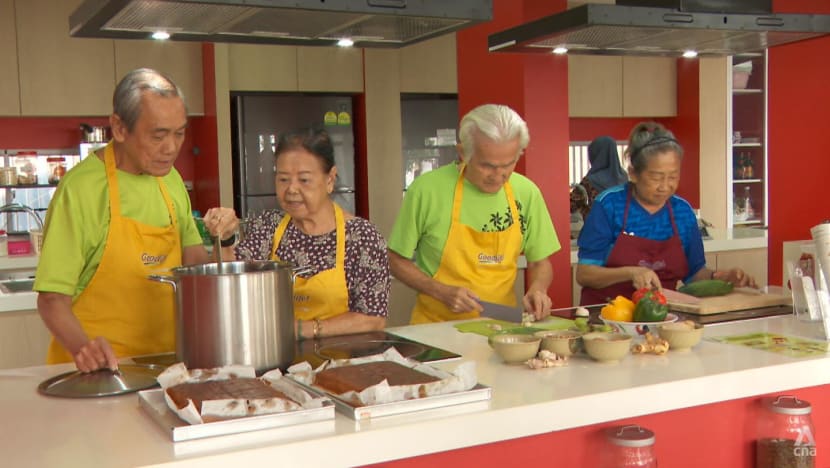Using apples instead of sugar to sweeten fried rice: How seniors are learning to cook healthier
As part of Singapore General Hopsital's research, the elderly get asked whether they know the distinction between healthy and unhealthy eating.

One change that the cooks at community kitchen Goodlife Makan have made is using apples instead of sugar to sweeten fried rice.

This audio is generated by an AI tool.
SINGAPORE: Seniors need to eat healthy, but may not know how to do so.
To help them, the Singapore General Hospital (SGH) is conducting interviews and focus group discussions to find out what the gaps in knowledge are.
Based on what the team discovers, by the end of 2027, all active ageing centres will get guidelines on how to encourage healthy diets. There are currently more than 150 such centres.
The programme aims to help seniors manage their medical conditions through healthy food habits, and ultimately improve health outcomes.
One community kitchen, Goodlife Makan in Marine Terrace, which provides meals for seniors who live alone, has already benefitted from SGH's expertise in the initial phase of the programme. In March, a dietitian visited the centre to provide feedback on recipes.
ADAPTING TO CHANGES
On top of using lower sugar and salt, the seniors learnt the concept of the healthy plate which recommends portions for different food types.
Although the seniors may want to stick to a recipe they have been using for years, they can be open to changes, said Ms Ong Boon Cheng, assistant manager at Goodlife Makan, which is run by social services organisation Montfort Care.
“Every grandma has her own recipe using a particular brand of sesame oil and oyster sauce to make their perfect sesame chicken, but through education … they can be quite receptive to changing,” she said.
One change that the cooks have made is using apples instead of sugar to sweeten fried rice.
Madam Lin Yan Qing, 84, a volunteer who cooks at the community kitchen for her fellow seniors, said that keeping the food tasty while also healthy is a challenge.
However, she understands the need to improve recipes.
"We are old and we have to take care of ourselves. The most important thing is health. Otherwise, nothing matters,” she said.
EMPOWERING SENIORS
As part of SGH’s research, the elderly get asked whether they know the distinction between healthy and unhealthy eating, said the hospital’s principal dietician Joycelyn Er.
If they are aware, they are asked how they apply the knowledge in their daily cooking, she added.
At Goodlife Makan, the team found out that some seniors had low nutrition awareness and literacy, said Ms Er.
The team attempted to improve their knowledge through games and also by displaying nutrition snippets.
SGH has also conducted similar research at Bukit Purmei, where the seniors are more nutrition-savvy. Such individuals can be trained to impart their knowledge to their peers, said Ms Er.
“What we are aiming to do is to build up capability within the community so as to empower the seniors,” she said.
GUIDELINES FOR ACTIVE AGEING CENTRES
SGH will measure the success of the programme by looking at whether the nutritional knowledge and status of seniors have improved over a three-year period, said Associate Professor Low Lian Leng, chairman of SGH’s division of population health and integrated care.
The guidelines that SGH will come up with are part of its broader community initiative to strengthen preventive health for seniors and help them age in place.
SGH is also conducting a three-year baseline study on the physical and social needs of seniors.
This will inform what changes seniors might need in the built environment, and technology, as well as to keep them socially engaged.
Singapore has a rapidly ageing population and many seniors want to age in place in their own neighbourhoods, Assoc Prof Low noted.
“It's very important that we have multiple initiatives, multiple components that can support them,” he said.

















